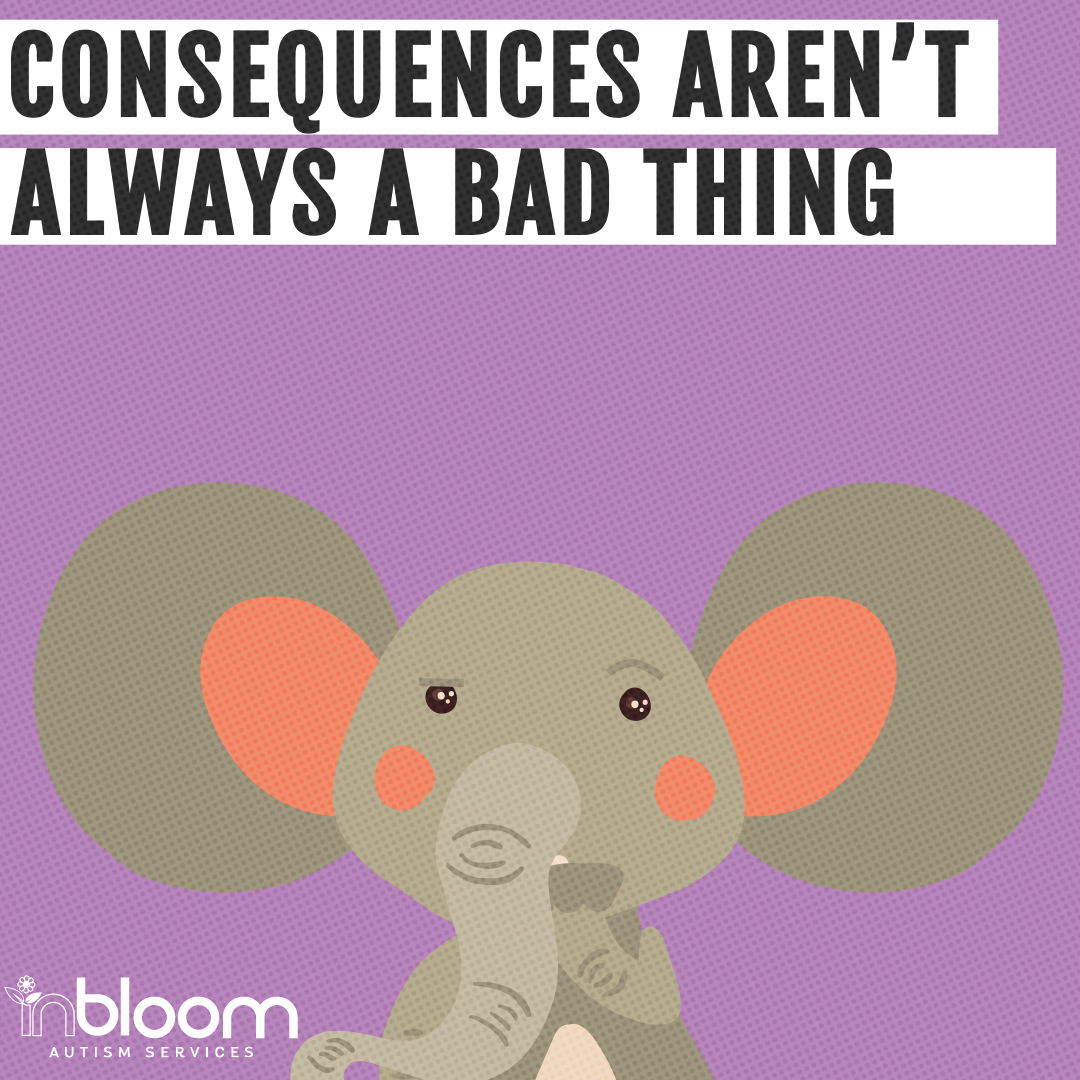Understanding the consequences of behavior in autism

Every behavior has a consequence, but in ABA therapy, that’s not always a bad thing.
The consequences of behavior are simply what happens after a behavior, and they play a vital role in helping children with autism learn how their actions shape the world around them.
At InBloom Autism Services, our clinicians use compassionate, evidence-based strategies to connect each child’s actions to positive, meaningful outcomes that encourage learning, communication, and growth.
By understanding how consequences influence behavior, parents and caregivers can help children develop essential life skills in a way that feels supportive, consistent, and rewarding.
To learn more about how consequences are used in ABA therapy, continue reading or contact our team today.
Consequences aren’t always a bad thing
In everyday life, the word “consequence” often sounds negative. We tend to associate it with punishment, like losing screen time or being grounded, but in the world of ABA therapy, a consequence simply means the result of a behavior.
Consequences can increase positive behaviors or reduce challenging ones, depending on how they’re used. For example:
- A child says “please” and receives a favorite snack. This is a positive consequence that reinforces the behavior.
- A child throws a toy, and it is removed for a short time. This is a negative consequence that helps decrease the behavior.
By using consistent, meaningful consequences, therapists teach children that their actions have predictable outcomes, helping them understand cause and effect in a positive, encouraging way.
Understanding behavior and consequences
Understanding how behavior and consequences work together is key to helping children learn and grow.
In ABA therapy, every action is followed by a response that teaches a lesson, demonstrating to children how their choices influence what happens next. These consistent cause-and-effect experiences help build understanding, confidence, and communication over time.
What are behavioral consequences?
A behavior consequence is anything that happens immediately after a behavior. In ABA therapy, these moments help children learn which actions lead to positive results.
For example, if a child puts on their shoes and the therapist says, “Great job, you’re ready for the playground!” that praise becomes a reinforcing consequence, making the child more likely to repeat the behavior.
How consequences shape learning and behavior in autism
Children with autism often thrive in environments that provide structure and consistency. By linking behaviors to clear, consistent outcomes, ABA therapy helps children understand what actions lead to rewards. Over time, positive reinforcement builds confidence, encourages open communication, and helps new skills become an integral part of daily routines.
What is the Antecedent-Behavior-Consequence (ABC) model in behavior analysis?
The ABC model is a foundational tool in behavior analysis that helps therapists understand the reasons behind behaviors. It breaks each event into three parts:
- Antecedent: What happens before the behavior
- Behavior: The child’s response or action
- Consequence: What happens after the behavior
Here are examples of each:
- Antecedent: The therapist says, “Time to clean up toys.”
- Behavior: The child starts cleaning up.
- Consequence: The therapist praises the child and gives a sticker.
This structure helps clinicians identify patterns and adjust their responses to encourage more positive outcomes.
How it helps track and modify behavior in ABA therapy
By observing these patterns, clinicians can change what happens before or after a behavior to promote learning. This data-driven approach helps ensure therapy remains individualized, effective, and progress-focused.
Types of consequences explained
Understanding the different types of consequences helps parents and therapists guide children toward positive, lasting behavior change. In ABA therapy, consequences aren’t about discipline; they’re about teaching, reinforcing, and helping children learn from every experience.
Positive consequences for behavior
A positive consequence adds something rewarding after a desired behavior, increasing the likelihood it will happen again. Examples include:
- Verbal praise after sharing a toy
- Extra playtime after following directions
- A sticker or token for completing a task
Positive reinforcement builds confidence and teaches that good behavior leads to enjoyable results.
Negative consequences for behavior
A negative consequence removes something a child enjoys to help reduce an unwanted behavior. Examples include:
- Taking a short break from play after hitting
- Removing a toy that causes distraction
At InBloom Autism Services, these strategies are used carefully and paired with teaching moments that show children what to do instead, rather than focusing on punishment.
Natural vs. logical consequences in behavior management
- Natural consequences happen automatically. For example, refusing to wear a jacket and feeling cold.
- Adults create logical consequences to teach accountability, such as cleaning up a spill after knocking over juice.
Both approaches teach children about cause and effect, but logical consequences are particularly effective in structured settings, such as ABA therapy.
Effective consequences for behavior change in ASD
Using effective consequences helps children with autism understand expectations and learn new skills in a supportive way. In ABA therapy, these strategies focus on teaching positive behaviors through consistency, encouragement, and meaningful reinforcement.
Designing consequences to teach better behavior instead of punish
The goal of ABA therapy is not to punish, it’s to teach. Therapists design consequences that show children what to do instead of focusing only on what not to do.
For example, if a child yells for attention, the therapist might not respond to the yelling but will immediately reinforce calm communication, teaching a better way to express needs.
Behavior consequence strategies for autism spectrum disorder
Effective behavior management includes:
- Immediate feedback: Reinforce or redirect the behavior right after it occurs.
- Consistency: Ensure that all caregivers and therapists respond in a uniform manner.
- Visual supports: Use picture cards or visuals to connect actions with outcomes.
- Choice-based learning: Let children choose rewards that motivate them.
These strategies help children feel supported and in control of their learning experience.
Encouraging positive reinforcement over punishment
Positive reinforcement strengthens trust, motivation, and skill development.
When children learn that good choices lead to enjoyable outcomes, like play, praise, or attention, they naturally repeat those behaviors. This approach creates lasting, meaningful progress in communication, cooperation, and confidence.
How InBloom uses behavior-management consequences
At InBloom Autism Services, every behavior plan is individualized. Our clinicians utilize the science of ABA therapy, combined with compassion and creativity, to help children learn through encouragement rather than fear.
Each session is guided by data, allowing our Board Certified Behavior Analysts (BCBAs) to continually evaluate what works best for each child’s development. We focus on positive reinforcement, replacement behaviors, and collaboration with families to create consistent progress both in our centers and at home.
Helping children grow through positive consequences
At InBloom Autism Services, we believe every moment is an opportunity for growth.
By pairing structure, compassion, and play-based reinforcement, we help children understand that their actions have meaning and that positive choices lead to positive outcomes.
Contact us today to discover how ABA therapy can help your child thrive through encouragement, motivation, and support.
Frequently asked questions about behavior consequences
Parents often have questions about how consequences work in ABA therapy and how to use them at home. This section answers common questions to help you better understand how positive and negative consequences shape learning and support your child’s progress.
Natural consequences happen on their own, such as getting wet after jumping in a puddle. Logical consequences are planned by adults and directly connect to the behavior, such as drying off and changing clothes afterward.
Praise, extra playtime, or small rewards, such as stickers, are great ways to reinforce positive behaviors. The key is timing. Provide the reinforcement immediately after the behavior so your child connects the action with the reward.
Not exactly. Every child responds differently. That’s why our clinicians perform preference assessments to identify what motivates each child, whether it’s praise, play, or tangible rewards.
BCBAs use data and observation to find patterns in behavior. They then design personalized reinforcement plans to encourage positive actions and minimize challenging behaviors in a supportive, safe way.
Yes. When used thoughtfully, negative consequences can help reduce unsafe behaviors without relying on punishment. At InBloom, we focus on teaching new, appropriate behaviors so children can communicate and self-regulate effectively.



